Deborah Swift's Blog, page 7
March 25, 2024
Find me in the Stars by Jules Larimore #CoffeePotBookClub Read an Excerpt
 EXCERPT FROM FIND ME IN THE STARS
EXCERPT FROM FIND ME IN THE STARS
Chapter 4
Flee Like the Mist from the Tempest’s Might – Jehan
26 September 1697 ~ Early Evening
Chomérac, France
Immediately after sunset, Jehan and his companions moved out again in their usual order, this time on foot, following Massip along the tracks of a rutted farm road toward a river crossing near Le Pouzin. The soft melodies of a nightingale gave Jehan a moment to ponder all that had been revealed while at the farm. It was most impressive, what he had learned.
An entire network of people and places existed throughout the realm that were available to aid refugees from the King’s persecutions. Massip explained that funding for it came from the far reaches of the globe—from those who held compassion for the oppressed of any creed, or from those who wanted to strengthen the position of the Protestant faith. Mostly English and Dutch nobility competing for philanthropic pursuits.
All was quiet along the road until they arrived at the signpost for Le Pouzin. But as they turned onto the main road, hoofbeats and rattling clamored in the distance. They looked at each other in a quandary since they could not yet see who might be approaching from around the next bend in the road. Likely a quartet of horses pulling a carriage or coach, by the sound of it.
Daniel Isnard ran up to Massip and grasped his arm. “What do we do?”
“Nothing. Just keep walking but form groups. As though you are friends heading to the tavern. ‘Tis best you show no reaction.”
Jehan could feel his throat tighten and ran a hand through his hair. Moyse hesitated and swayed, appearing as though he were about to lose his balance, so Jehan gave him his arm. Stéphane lent a hand with Moyse, and Syeira and Manfri fell back to walk alongside them.
The noise grew louder until lantern lights emerged from around the bend, creating an aura of light around the three hatmakers and Massip as they led the way ahead.
Jehan inhaled deeply, trying to maintain an impassive expression, but Moyse’s trembling was unsettling. Within moments, a grand carriage rushed by them, horses at a full canter.
“Don’t turn around,” said Stéphane.
The blood pulsed through Jehan’s temples as they waited for the hoofbeats to fade into the night.
Once it was quiet again, Stéphane spoke out. “Whoever it is, they must find themselves too important, and this band of peasants too undignified, to bother with us. By the looks of that fanciful carriage, they surely don’t need any blood money.”
Jehan chuckled to himself at the good fortune in that. Allowing himself to find some humor eased the tension, and the pulsing that hammered through his head gradually ceased.
Massip veered off the main road down a moonlit path, and they all scurried to keep up. Soon they were deep in silvery reeds where a chorus of croaking frogs surrounded them, and the musky breath of marshland filled Jehan’s nostrils with the smell of fish and algae and wet earth.
In an abrupt movement, Massip stopped in a small clearing, then pulled a coil of rope from a satchel. “You may not desire your boots to get wet,” he said as tied the rope around his waist, “but keep them on. The marshes are home to the Vipère snake.”
Anne gasped and leaned her head around the others as if searching for Stéphane.
Syeira put a hand on Anne’s shoulder and said, “They are likely to slither away when they hear us.”
“Scared of us, they are,” added Manfri, animated hands and face aiding his limited grasp of the French language.
Tiny moonshadows formed across Syeira’s nose as she wrinkled it. “And the silly things don’t even know how to strike with their mouth open. The greatest danger they pose is their dreadful scent.”
As Massip began tying each of them to the rope, forming a long chain, he continued his instructions. “Ladies. ‘Twill be best if you bring your skirts up between your legs and tie them.”
Anne’s face pinched together, a gruesome look in the dim light, the shadows magnifying her dissatisfaction.
“Do not give me that look, Mademoiselle Broussard,” Massip grumbled as he cinched the rope about her waist with an abrupt tug. “If your skirts are caught in the current or snagged on a rock, it will pull us all under. Now . . . for those of you who do not have satchels with back straps, place them on your heads to keep them dry as we cross. And keep silent as we move out.”
Moyse clutched at Jehan’s arm and muttered. “You should go on without me.”
“Moyse,” Jehan said softly, looking deep into the old man’s eyes. The rising moon reflected there would give them light to see, but it also increased the risk of being spotted. He knew he had to give Moyse some courage, some hope. “As long as we take our time, it will be fine. As we cross, let us keep our minds on the warm hearth and splendid companionship we shall find in the company of my Uncle Barjon’s community.”
Moyse nodded again and again and again as though the motion would help him convince himself.
More about the book: “Larimore’s ability to engulf a reader into a tale… is brilliantly done.” 5-star Highly Recommended Award of Excellence ~ Historical Fiction Company Separated by miles, connected by the stars, two healers forge their destinies in a quest for a brighter tomorrow. Inspired by a true story, this refugee’s tale of sacrifice, separation, and abiding love unfolds in the Cévennes Mountains of Languedoc, France, 1697. A sweeping adventure during the time of Louis XIV’s oppressive rule and persecutions, this compelling narrative follows the intertwined destinies of two remarkable protagonists, Amelia Auvrey, a mystic holy-woman healer, and Jehan BonDurant, an apothecary from a noble Huguenot family, in a riveting tale of enduring love, faith, and the search for light in the darkest of times.Amelia and Jehan are fierce champions of tolerance and compassion in their cherished Cévenole homeland, a region plagued by renewed persecution of Huguenots. The escalated danger forces their paths to diverge, each embarking on their own dangerous journey toward survival and freedom. The Knights Hospitaller provide protection and refuge for Amelia and her ailing sage-femme grandmother, even as they come under suspicion of practicing witchcraft. And, to avoid entanglement in a brewing rebellion, Jehan joins a troupe of refugees who flee to the Swiss Cantons seeking sanctuary—a journey that challenges his faith and perseverance. Jehan arrives to find things are not as he expected; the Swiss have their own form of intolerance, and soon immigrants are no longer welcome. The utopian Eden he seeks remains elusive until he learns of a resettlement project in the New World.During their time apart, Amelia and Jehan rely on a network of booksellers to smuggle secret letters to each other—until the letters mysteriously cease, casting doubt on their future together. Jehan is unclear if Amelia will commit to joining him, or if she will hold fast to her vow of celibacy and remain in the Cévennes. Seemingly ill-fated from the start, their love is tested to its limits as they are forced to navigate a world where uncertainty and fear threaten to eclipse their unwavering bond.BUY THE BOOKAbout Jules Larimore Jules Larimore is the author of emotive, literary-leaning historical fiction with a dose of magic, myth, and romance to bring to life hopeful human stories and inspire positive change. She is a member of France’s Splendid Centuries authors’ collaborative, a board member of the Historical Novel Society of Southern California, and lives primarily in Ojai with time spent around the U.S. and Europe gathering a rich repository of historical research in a continued search for authenticity.Author Links:Website • Twitter • Facebook • Instagram • ThreadsAmazon Author Page • Pinterest • LinkedIn • BookBub • GoodreadsThe post Find me in the Stars by Jules Larimore #CoffeePotBookClub Read an Excerpt first appeared on Deborah Swift.
Jules Larimore is the author of emotive, literary-leaning historical fiction with a dose of magic, myth, and romance to bring to life hopeful human stories and inspire positive change. She is a member of France’s Splendid Centuries authors’ collaborative, a board member of the Historical Novel Society of Southern California, and lives primarily in Ojai with time spent around the U.S. and Europe gathering a rich repository of historical research in a continued search for authenticity.Author Links:Website • Twitter • Facebook • Instagram • ThreadsAmazon Author Page • Pinterest • LinkedIn • BookBub • GoodreadsThe post Find me in the Stars by Jules Larimore #CoffeePotBookClub Read an Excerpt first appeared on Deborah Swift.
Spotlight on #NewRelease Riddle of the Gods by Eric Schumacher #Norway
Congratulations to Eric Schumacher, – his new book Riddle of the Gods is out today!
TITLE: Riddle of the Gods
RELEASE DATE: March 25, 2024
SALES LINK: https://mybook.to/Riddleofthegods
ABOUT THE BOOK
Riddle of the Gods is the riveting fourth novel in the best-selling series chronicling the life and adventures of one of Norway’s most controversial kings, Olaf Tryggvason.
It is AD 976. Olaf Tryggvason, the renegade prince of Norway, has lost his beloved wife to a tragedy that turns the lords of the land he rules against him. With his family gone and his future uncertain, Olaf leaves his realm and embarks on a decades-long quest to discover his course in life. Though his journey brings him power and wealth, it is not until he encounters the strange man in the streets of Dublin that his path to fame unfolds. And in that moment, he is forced to make a choice as the gods look on – a choice that could, at worst, destroy him and at best, ensure his name lives on forever.
EARLY REVIEWS:
“If you want to experience the Viking Age as it really must have felt, then read this book. I know of few novelists who can transport you there with greater skill and accuracy than Eric Schumacher. A gripping, intelligent novel of the Viking world.” – Theodore Brun, historical fiction author
“Full of rousing battles and journeys over land and sea, Riddle of the Gods sees the protagonists strained and broken in ways not encountered in the earlier volumes.” – Rowdy Geirsson, Viking author
“A truly well-written book which has the reader gripped and yearning for more.” – Stacy Townend, historical fiction author
“Lots of twists that will keep you turning pages until the end.” – Mercedes Rochelle, historical fiction author
ABOUT ERIC
Eric was born and raised in Los Angeles, California, and has had a lifelong love affair with writing, history and Dark Age Europe. As a 20-year veteran of PR, marketing and copywriting, Eric has told the story of numerous companies, products and individuals. His first novel, God’s Hammer, tells the true story of King Hakon Haraldsson’s bitter fight against his ruthless brother Erik Bloodaxe for the High Seat of the Viking North. Eric currently resides in Santa Barbara,
Contact Eric – website Twitter @DarkAgeScribe
BUY RIDDLE OF THE GODS https://mybook.to/Riddleofthegods
March 14, 2024
A Matter of Time by Judith Arnopp #CoffeePotBookClub #Tudor #Review
 About the Book:With youth now far behind him, King Henry VIII has only produced one infant son and two bastard daughters. More sons are essential to secure the Tudor line and with his third wife, Jane Seymour dead, Henry hunts for a suitable replacement.After the break from Rome, trouble is brewing with France and Scotland. Thomas Cromwell arranges a diplomatic marriage with the sister of the Duke of Cleves but when it comes to women, Henry is fastidious, and the new bride does not please him. The increasingly unpredictable king sets his sights instead upon Katherine Howard and instructs Cromwell to free him from the match with Cleves.Failure to rid the king of his unloved wife could cost Cromwell his head.Henry, now ailing and ageing, is invigorated by his flighty new bride but despite the favours he heaps upon her, he cannot win Katherine’s heart. A little over a year later, broken by her infidelity, she becomes the second of his wives to die on the scaffold, leaving Henry friendless and alone.But his stout heart will not surrender and leaving his sixth wife, Katheryn Parr, installed as regent over England, Henry embarks on a final war to win back territories lost to the French more than a century before. Hungry for glory, the king is determined that the name Henry VIII will shine brighter and longer than that of his hero, Henry V.Told from the king’s perspective, A Matter of Time: Henry VIII: the Dying of the Light shines a torch into the heart and mind of England’s most tyrannical king.Buy the book: Universal LinkAbout Judith Arnopp
About the Book:With youth now far behind him, King Henry VIII has only produced one infant son and two bastard daughters. More sons are essential to secure the Tudor line and with his third wife, Jane Seymour dead, Henry hunts for a suitable replacement.After the break from Rome, trouble is brewing with France and Scotland. Thomas Cromwell arranges a diplomatic marriage with the sister of the Duke of Cleves but when it comes to women, Henry is fastidious, and the new bride does not please him. The increasingly unpredictable king sets his sights instead upon Katherine Howard and instructs Cromwell to free him from the match with Cleves.Failure to rid the king of his unloved wife could cost Cromwell his head.Henry, now ailing and ageing, is invigorated by his flighty new bride but despite the favours he heaps upon her, he cannot win Katherine’s heart. A little over a year later, broken by her infidelity, she becomes the second of his wives to die on the scaffold, leaving Henry friendless and alone.But his stout heart will not surrender and leaving his sixth wife, Katheryn Parr, installed as regent over England, Henry embarks on a final war to win back territories lost to the French more than a century before. Hungry for glory, the king is determined that the name Henry VIII will shine brighter and longer than that of his hero, Henry V.Told from the king’s perspective, A Matter of Time: Henry VIII: the Dying of the Light shines a torch into the heart and mind of England’s most tyrannical king.Buy the book: Universal LinkAbout Judith Arnopp
 A lifelong history enthusiast and avid reader, Judith holds a BA in English/Creative writing and an MA in Medieval Studies. She lives on the coast of West Wales where she writes both fiction and non-fiction. She is best known for her novels set in the Medieval and Tudor period, focusing on the perspective of historical women but recently she has been writing from the perspective of Henry VIII himself.Judith is also a founder member of a re-enactment group called The Fyne Companye of Cambria which is when she began to experiment with sewing historical garments. She now makes clothes and accessories both for the group and others. She is not a professionally trained sewer but through trial, error and determination has learned how to make authentic looking, if not strictly historically accurate clothing. Her non-fiction book, How to Dress like a Tudor was published by Pen and Sword in 2023.Contact JudithWebsite • Blog • Twitter • Facebook • Instagram • Bluesky • ThreadsAmazon Author Page • BookBub • LinkedIn • Pinterest • Goodreads
A lifelong history enthusiast and avid reader, Judith holds a BA in English/Creative writing and an MA in Medieval Studies. She lives on the coast of West Wales where she writes both fiction and non-fiction. She is best known for her novels set in the Medieval and Tudor period, focusing on the perspective of historical women but recently she has been writing from the perspective of Henry VIII himself.Judith is also a founder member of a re-enactment group called The Fyne Companye of Cambria which is when she began to experiment with sewing historical garments. She now makes clothes and accessories both for the group and others. She is not a professionally trained sewer but through trial, error and determination has learned how to make authentic looking, if not strictly historically accurate clothing. Her non-fiction book, How to Dress like a Tudor was published by Pen and Sword in 2023.Contact JudithWebsite • Blog • Twitter • Facebook • Instagram • Bluesky • ThreadsAmazon Author Page • BookBub • LinkedIn • Pinterest • Goodreads
 The post A Matter of Time by Judith Arnopp #CoffeePotBookClub #Tudor #Review first appeared on Deborah Swift.
The post A Matter of Time by Judith Arnopp #CoffeePotBookClub #Tudor #Review first appeared on Deborah Swift.
February 15, 2024
I’m on tour for The Shadow Network #CoffeePotBookClub #HistoricalFiction #WW2
Virtual Book Tour
I’m on tour for the next moth visiting various blogs courtesy of the Coffee Pot Book Club!
You can find all the links here on their site:
https://thecoffeepotbookclub.blogspot.com/2023/12/blog-tour-the-shadow-network-by-deborah-swift.html
On the tour you’ll find me talking about these historical aspects of The Shadow Network
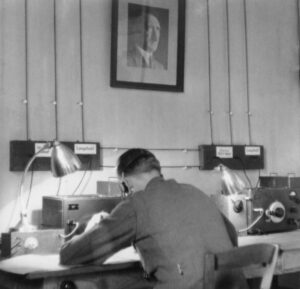
As well as my general research into life during WW2. I’m also doing a few interviews about my writing process so I do hope you’ll be curious enough to follow the tour. Thank you to all the readers, writers and bloggers who have hosted my posts.
The post I’m on tour for The Shadow Network #CoffeePotBookClub #HistoricalFiction #WW2 first appeared on Deborah Swift.
January 16, 2024
Weaving Mama’s Dress through The Low Road – a blog post by Katharine Quarmby #CoffeePotBookClub
Weaving Mama’s dress through The Low Road – a writer’s process
Katharine Quarmby
“The good wife had given me a grey dress, in a soft cotton, and I had hand sewn our favourite flowers around the hem, cornflowers for me, and poppies for George.”
This dress, given to the “dear mama” of the main character in The Low Road, Hannah, is woven throughout the novel. It was to have been the dress that her mother had worn to marry her father, George, but before they can wed he dies in an awful industrial accident and so, instead, it is wrapped and kept, and becomes a memory of past happiness.
It is really Hannah’s only belonging when her mother dies and she is left an orphan, in terrible circumstances. At that point, early on in the first part of the novel, Hannah has lost pretty much everything – her home on a farm where she had grown up with her mother in rural Norfolk, her only living relative to speak of, and her family’s reputation.
The local doctor and his wife, the White family, take pity on her and give her a new home in the local town of Harleston. Hannah takes one last look on the room she shared with her mother on the farm and decides to take the “the dress Mama had sewn for the wedding day that had never happened. I folded it carefully, and put it in the bundle.” She leaves her hoop, a precious toy, for she knows she has to grow up now.
Hannah’s life in rural Norfolk lasts for just four more years before she commits a very minor crime and the townsfolk decide she should leave after the kindly Mrs White dies in childbirth. After a night in the parish lock-up, she is to be sent to London with the housekeeper of an attorney in Harleston.
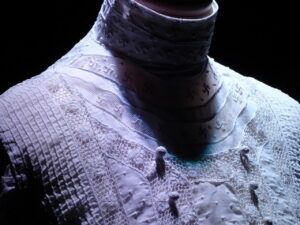
“Mrs Thurlow had made a space between herself and a large man, whose girth lapped me as I sat down. I shrank away from him. She passed me a small bundle. “I packed up your room for you, child. Everything is there.” Then, lowering her voice, “Your mama’s items too, her dress.” I felt the tears prickling, looked down at the bag and hugged it close”.
Mrs Thurlow takes Annie to an orphanage in London, the Refuge for the Destitute, where she is admitted as what was then called being an ‘object’. At last Hannah has security and can put the traumatic past behind her and another girl, Maria, becomes a friend. But she clings her mama’s dress and when she meets another so-called object, Annie, also convicted of stealing, they take to pilfering small objects from the Refuge’s laundry, where they are put to work, as they become closer and Maria, jealous of their friendship, withdraws. They dream of a life together.
“I loosened three floorboards below my hammock, and put together what I remembered Mama had called her trousseau. Stored against a future. With Annie. I hid the thought underneath, next to Mama’s dress, folded in paper so that each time I added an item there was a crackle.”
But Hannah and Annie’s closeness is put under threat when Hannah is sent into service. Annie is bereft, even when Hannah promises that she will come back, and they sneak upstairs together before she goes, to go through the few items they have together, hidden underneath floorboards. “so few things we have to call our own…Underneath everything is mam’s dress. I unfold it, run my finger over the flowers she had sewn, hold the fine fabric to my face. Her scent has drited away but for a moment I close my eyes and she feels nearby. I wish I could summon up her voice but it is faint now.”
Hannah does come back, as she promises, but then their life takes a turn for the worse, for Annie is to be sent into service, with the abusive family that Hannah has just left. In desperation the girls steal laundry and try to sell it, but before they can do so and leave the Refuge forever, they are arrested, sent to Newgate Prison and then convicted to transportation in the Old Bailey. Their relationship becomes frayed, and almost destroyed, by everything that they end up going through, including time in the Female Penitentiary and then on prison hulks. Even though they are pardoned, they are effectively separated by the time that they are both eventually transported, on different ships, not knowing if they will ever meet again.
Before Hannah is transported, she has a visit to her prison ship by the matron of the Penitentiary, who tries to help her and even visits the Refuge. There, her old friend Maria, takes the matron aside and gives her a small package – Hannah’s only heirloom, her mother’s dress. Mrs Martin hands it over to her, before she sails: “a package, tied up in paper and string…I knew it straight away and then I wept again.”
Hannah arrives in Sydney Cove, once called Botany Bay, in 1829. She ends up being one of the lucky ones – assigned to a decent couple, Frank and Eleanor, who is ailing. She knows that she will be safe on the farm they own, and Frank makes sure that she is set free from assignment once his wife dies, and eventually they fall in love and are to be married.
“Some days before we are to be wed, I unwrap my mama’s dress and wash it…the flowers she has embroidered are as bright as ever…and when I slip it on I find it fits me almost perfectly, outlines the curves I have, inherited from her….I am nearly the age that my mama was when she died. I will go on past her and leave her behind me, younger than I am.”
It tears after the simple wedding service, and yet Hannah finds this doesn’t matter to her anymore.
“It doesn’t matter. I have carried the dress with me across years and thousands of miles and I married him in it.”
This could have been a simple, happy ending, but Hannah could not but help look for her old friend, Annie, who she and Frank find in desperate circumstances, in a prison near Sydney. It takes months before she has started to heal from the traumas she has gone through, and there is more pain to come for Hannah as well. She has a son, called Frankie, and his birth brings back memories of everything that her dear mama had suffered.
But, towards the end, the two of them become friends again, and when it is time for Frankie’s christening, Annie offers to mend Hannah’s wedding dress, and turn it into a garment for the baby.
“She has cut the good fabric clear from the rot, and sewn a gown for the baby….saved my mama’s stitching, where she can, and woven vines around her cornflowers.”
Hannah’s story throughout The Low Road is one of pain, but also of love; it celebrates the resilience of women and their dogged ability to keep going, and to treasure the things and people that are important. The dress is one of the ways in which I explored love, loss, the fraying of bonds and the importance of repairing and mending things that were once broken.
 ABOUT THE LOW ROAD
ABOUT THE LOW ROAD
 Katharine Quarmby has written non-fiction, short stories and books for children and her debut novel, The Low Road, is published by Unbound in 2023. Her non-fiction works include Scapegoat: Why We Are Failing Disabled People (Portobello Books, 2011) and No Place to Call Home: Inside the Real Lives of Gypsies and Travellers (Oneworld, 2013). She has also written picture books and shorter e-books.She is an investigative journalist and editor, with particular interests in disability, the environment, race and ethnicity, and the care system. Her reporting has appeared in outlets including the Guardian, The Economist, The Atlantic, The Times of London, the Telegraph, New Statesman and The Spectator. Katharine lives in London.Katharine also works as an editor for investigative journalism outlets, including Investigative Reporting Denmark and the Bureau of Investigative Journalism.
Katharine Quarmby has written non-fiction, short stories and books for children and her debut novel, The Low Road, is published by Unbound in 2023. Her non-fiction works include Scapegoat: Why We Are Failing Disabled People (Portobello Books, 2011) and No Place to Call Home: Inside the Real Lives of Gypsies and Travellers (Oneworld, 2013). She has also written picture books and shorter e-books.She is an investigative journalist and editor, with particular interests in disability, the environment, race and ethnicity, and the care system. Her reporting has appeared in outlets including the Guardian, The Economist, The Atlantic, The Times of London, the Telegraph, New Statesman and The Spectator. Katharine lives in London.Katharine also works as an editor for investigative journalism outlets, including Investigative Reporting Denmark and the Bureau of Investigative Journalism.Contact Katharine
Website • Twitter • Facebook • LinkedIn • Instagram •
Amazon Author Page • Goodreads
December 18, 2023
Beautiful Ghost by Milana Marsenich #CoffeePotBookClub #20thCentury #HistoricalFiction
About Beautiful Ghost
During the fall of 1918, the influenza pandemic crosses the nation and reaches the mining town of Butte, Montana.
Marika Jovich, who wants to go to school to become a physician, works menial tasks for Dr. Fletcher. She feels useless as she tries to save friends and neighbors from the ravages of the flu. In the midst of the pandemic, she watches the town shut down, young and old perish, and her medical dreams all but evaporate.
Kaly Monroe used to be a half-good woman of the night. She left that life to raise her daughter, Annie, and live and work with her long-lost mother, Tara McClane. Kaly waits for her husband, Tommy, to return from the war. Word from the east is that soldiers are dying of influenza and she prays that Tommy is not one of them.
When an out-of-town woman named Amelia suddenly dies in Dr. Fletcher’s office, both women try to learn more about the mysterious woman and the circumstances regarding her death. Is she another casualty of the pandemic, or the victim of manmade foul play? Who is this stranger, and is her demise a portent of the fate that awaits the residents of Butte?
Praise for Beautiful Ghost:
“Marsenich doesn’t just describe the place and times, she conjures it up like time travel.” ~ Amazon Review by Ellen Leahy Howell
READ A SNIPPET
The Wolf DogThe wolf dog wanders through the town where mining fumes singe the air, and tin shacks, thrown together in desperation, sit next to French mansions and yards flagged with cobblestone. He rambles past the Cabbage Patch, where bootleggers and criminals live in downtrodden shanties and the king of the Patch rules the poor with an iron club. The dog walks through Dublin Gulch, a rough bit of Butte, inhabited by stubborn Irish people and sour-faced old women, who rarely shop for fine china or cast-iron pots at the town’s one department store. He continues his journey through Chinatown, past the opium dens, and down to the train depot on East Front Street.
He sits on the platform, under a center overhang, out of the rain, and watches the passengers disembark. Soot covers every surface of the depot, and, as the sky darkens, the wolf dog feels something coming. Something rising up out of the ground, on the wind, or perhaps in a blanket. Or maybe, a young woman carries it in her lap as the train roars across the country from the east to Montana. This tiny thing is barely a whisper. But it’s there, wanting to live and live strong. It floats among the people hugging and kissing in the depot’s large waiting room. It lights on jackets of men smoking, and hovers in the perfumed air where women tend to private matters.
Buy The Book Universal Buy Link
About the AuthorAward winning author, Milana Marsenich lives in Northwest Montana near Flathead Lake at the base of the beautiful Mission Mountains. She enjoys quick access to the mountains and has spent many hours hiking the wilderness trails with friends and dogs. For the past 20 years she has worked as a mental health therapist in a variety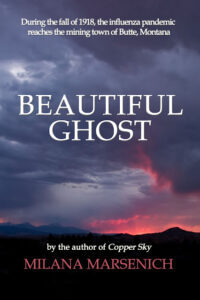 of settings. As a natural listener and a therapist, she has witnessed amazing generosity and courage in others. She first witnessed this in her hometown of Butte, Montana, a mining town with a rich history and the setting for Copper Sky, her first novel.Copper Sky was chosen as a Spur Award finalist for Best Western Historical Novel in 2018. Her second novel, The Swan Keeper, was a Willa Award finalist in 2019. Her short story, Wild Dogs, won the Laura Award for short fiction in 2020.She has an M.Ed. in Mental Health Counseling from Montana State University and an MFA in Creative Writing from the University of Montana. She has previously published in Montana Quarterly, Big Sky Journal, The Polishing Stone, The Moronic Ox, BookGlow, and Feminist Studies.She has three published novels, Copper Sky, The Swan Keeper, and Beautiful Ghost, and one popular history book, Idaho Madams. Her upcoming novel, Shed Girl: A Juliet French Novel, will be released January 2024.Find MilanaWebsite • Twitter • Facebook • Instagram • PinterestAmazon Author Page • BookBub • GoodreadsThe post Beautiful Ghost by Milana Marsenich #CoffeePotBookClub #20thCentury #HistoricalFiction first appeared on Deborah Swift.
of settings. As a natural listener and a therapist, she has witnessed amazing generosity and courage in others. She first witnessed this in her hometown of Butte, Montana, a mining town with a rich history and the setting for Copper Sky, her first novel.Copper Sky was chosen as a Spur Award finalist for Best Western Historical Novel in 2018. Her second novel, The Swan Keeper, was a Willa Award finalist in 2019. Her short story, Wild Dogs, won the Laura Award for short fiction in 2020.She has an M.Ed. in Mental Health Counseling from Montana State University and an MFA in Creative Writing from the University of Montana. She has previously published in Montana Quarterly, Big Sky Journal, The Polishing Stone, The Moronic Ox, BookGlow, and Feminist Studies.She has three published novels, Copper Sky, The Swan Keeper, and Beautiful Ghost, and one popular history book, Idaho Madams. Her upcoming novel, Shed Girl: A Juliet French Novel, will be released January 2024.Find MilanaWebsite • Twitter • Facebook • Instagram • PinterestAmazon Author Page • BookBub • GoodreadsThe post Beautiful Ghost by Milana Marsenich #CoffeePotBookClub #20thCentury #HistoricalFiction first appeared on Deborah Swift.
December 17, 2023
Twelfth Cake House by Heidi Eljarbo #Historical #Romance #CoffeePotBookClub
Even a clever matchmaker may need a push in the right direction if she’s to find true love. When she’s asked to find a match for herself, it proves to be the most difficult task she’s ever undertaken.
Mid-December 1796.
Sixty-year-old spinster Miss Jemima Thurgood has three weeks to finish the preparations for her annual Twelfth Night party. In her position as a matchmaker, for over forty years she has assumed a grave responsibility. Luckily, she’s a shrewd observer of people, and many happy reunions have come about due to her exceptional talent for nudging kindred hearts in the right direction.
Every year, Jemima invites twelve carefully selected men and women to her festivity, and each guest is assigned a dinner partner. The days before the merrymaking are constantly disrupted by one unforeseen event after another. Jemima must work hard to be ready in time, and more importantly, to provide the kind of celebration her chosen guests deserve.
But this year, what Jemima doesn’t know is that her life is about to take a sudden change of course—one she could not have predicted or planned for. As the days pass, several gentlemen indicate they are interested in becoming better acquainted with her, but only a very special man can charm a matchmaker.
A sweet romance novella set during a witty and enchanting Georgian-Era Christmas, Twelfth Cake House is a story about traditions, goodwill, and finding hope and the courage to change and take a chance on finding true love.
BUY THE BOOK
#KindleUnlimited. International Buy Link
About Heidi Eljarbo
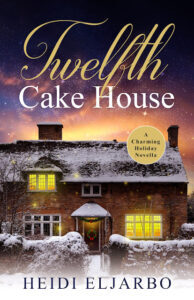 Heidi Eljarbo is the award-winning author of dual-timeline historical fiction with heartwarming clean romance, wit, and adventurous mystery.
Heidi Eljarbo is the award-winning author of dual-timeline historical fiction with heartwarming clean romance, wit, and adventurous mystery.
Heidi grew up in a home filled with books and artwork and never imagined she would do anything other than write and paint. She studied art, languages, and history, danced on the BYU Ballroom Dance Team, and still sings in choirs.
After living in Canada, six US states, Japan, Switzerland, and Austria, Heidi now calls Norway home. She and her husband have a total of nine children, and fifteen grandchildren—so far—in addition to a bouncy Wheaten Terrier.
Their favorite retreat is a mountain cabin, where they hike in the summertime and ski the vast, white terrain during winter.
Heidi’s favorites are family, God’s beautiful nature, and the word whimsical.
Author Links:
Website • Twitter • Facebook • Instagram • Pinterest
BookBub • Amazon Author Page • Goodreads
The post Twelfth Cake House by Heidi Eljarbo #Historical #Romance #CoffeePotBookClub first appeared on Deborah Swift.December 13, 2023
The Fortune Teller of Kathmandu by Ann Bennett #India #Burma #CoffeePotBookClub #wartime
Hampshire, UK, 2015. When Chloe Harper’s beloved grandmother, Lena dies, a stranger hands her Lena’s wartime diary. Chloe sets out to uncover deep family secrets that Lena guarded to her grave.
Darjeeling, India, 1943. Lena Chatterjee leaves the confines of a strict boarding school to work as assistant to Lieutenant George Harper, an officer in the British Indian Army. She accompanies him to Nepal and deep into the Himalayas to recruit Gurkhas for the failing Burma Campaign. There, she discovers that Lieutenant Harper has a secret, which she vows never to reveal.
In Kathmandu, the prophesy of a mysterious fortune teller sets Lena on a dangerous course. She joins the Women’s Auxiliary Service Burma (the Wasbies), risking her life to follow the man she loves to the front line. What happens there changes the course of her life.
On her quest to uncover her grandmother’s hidden past, Chloe herself encounters mystery and romance. Helped by young Nepalese tour guide, Kiran Rai, she finds history repeating itself when she is swept up in events that spiral out of control…
Review
I thoroughly enjoyed this wartime story set in Kolkata, Darjeeling, Nepal and finally wartime Burma.
The main character Chloe is on the trail of her grandmother to find out more of her life, and we read Lena’s (the grandmother’s story) through extracts from her diary. These are skilfully woven into the book and help the reader to flow seamlessly from the past to the present. The unusual locations and Ann Bennett’s descriptions of India and Burma are definitely a highlight of the book. There are two main male characters in the book, Billy, who Lena first meets in hospital, and George Harper, an army officer. We know from the beginning of the book who Lena chooses to spend her life with, but why? And what happened to the other man?
The settings are beautifully done – this is an era and place that appealed to me because of my own family history, and Ann Bennett more than delivered on my expectations. It is not all romance, as this is the war with Japan — and the army camps, the fighting, bombings and the grim reality of civilian tragedies are all well portrayed, and with all the visceral tension you would expect. A book such as this takes mountains of research, and here the research is fed into the book without overwhelming the reader.
If you are looking for a wartime story with romance and an unusual location, then try this, it’s a great read.
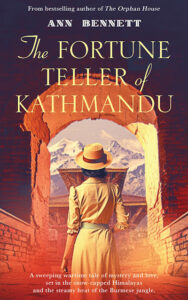 BUY THE BOOK
BUY THE BOOK
This title is available to read with #KindleUnlimited.
Universal Buy Link: https://mybook.to/tftok
About Ann Bennett
Ann Bennett is a British author of historical fiction. She was born in Pury End, a small village in Northamptonshire, UK and now lives in Surrey. Her first book, Bamboo Heart: A Daughter’s Quest, was inspired by researching her father’s experience as a prisoner of war on the Thai-Burma Railway. Bamboo Island: The Planter’s Wife, A Daughter’s Promise and Bamboo Road:The Homecoming, The Tea Panter’s Club and The Amulet are also about the war in South East Asia, which together with The Fortune Teller of Kathmandu make up the Echoes of Empire Collection.
Ann is also author of The Runaway Sisters, bestselling The Orphan House, The Forgotten Children and The Child Without a Home, published by Bookouture. The Lake Pavilion, The Lake Palace, both set in British India in the 1930s and WW2, and The Lake Pagoda and The Lake Villa, set in French Indochina during WW2, make up The Oriental Lake Collection.
Ann is married with three grown up sons and a granddaughter and works as a lawyer. For more details please visit https://www.annbennettauthor.com/
The post The Fortune Teller of Kathmandu by Ann Bennett #India #Burma #CoffeePotBookClub #wartime first appeared on Deborah Swift.November 26, 2023
Madame Pommery by Rebecca Rosenberg #Review #Champagne #HistoricalFiction #CoffeePotBookClub
Review of Madame Pommery by Rebecca Rosenberg
If you know nothing about how Champagne is made, or its history, then you can’t do better than to pick up this book. The painstaking and long process from choosing the right blend of grape to crushing and fermenting s described in intricate detail. Madame Pommery herself is a force of nature – a woman struggling in a man’s world, a woman who just won’t give up in her quest to convert the people to her new and drier taste of Champagne. Not content with retiring after her husband’s death Madame Pommery is determined to make a success of her husband’ Louis’ wine business, despite having to take care of her small children.
This is not as straightforward as it sounds, for just as she is about to launch her creation on the world, France is taken over by the Prussians and she must endure an occupation that ruins her fledgling business, and also puts all their lives at risk. The description of how it feels to be in this position is extremely well done – the powerlessness and rage. Later in the novel Madame Pommery discovers that the rubbish dump which covers the local lime pits, also covers miles of tunnels. These tunnels are ideal for storing her newly-minted wine. These cellars were the right temperature for storing her wine, and I believe many other wineries followed suit. Not only are the underground tunnels the answer to her storage problem, but also she uses them to house rebels and partisans. There is a gripping scene where they are discovered and the resisters are almost buried alive. Eventually she commissions a local sculptor to carve a frieze inside these cellars, the ‘Fete du Bacchus’, thus turning them into a sensational tourist attraction.
Throughout the novel, the characters are well-drawn, with several of Madame’s lovers and friends forming strong contrasts to her single-minded ambition. Her children too are true individuals, and even Felix the matagot – the pet that has a mind of its own. Rebecca Rosenberg has done immense amounts of research to bring the setting of 19th Century France alive with convincing amounts of detail. For those who love French history or the 19th Century this is very definitely a five star read and I recommend it without hesitation.
Thank you to the author and the Coffee Pot Book Club for this excellent book.
ABOUT MADAME POMMERY
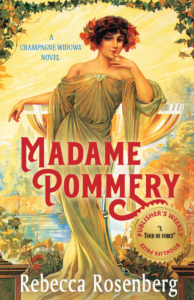 EDITORS CHOICE HISTORICAL NOVEL SOCIETY
EDITORS CHOICE HISTORICAL NOVEL SOCIETY
“A-Tour-de-Force” Publisher’s Weekly BookLife Prize
MADAME POMMERY, Creator of Brut Champagne
“A tour-de-force of historical fiction, Madame Pommery is a deeply fascinating work that blends true-to-life details with artfully crafted elements.” –Publishers Weekly BookLife Prize
Madame Pommery is a story of a woman’s indomitable spirit in the face of insurmountable odds. Set in Champagne, France in 1860, Madame Pommery is a forty-year-old widow and etiquette teacher whose husband has passed away. Now she must find a way to support her family. With no experience, she decides to make champagne, but no champagne makers will teach her their craft. Undeterred, Madame Pommery begins to secretly excavate champagne caves under the Reims city dump and faces numerous obstacles to achieve her dream. From the Franco-Prussian war that conscripts her son and crew to the Prussian General Frederick Franz occupying her home, Madame Pommery perseveres. She even must choose between her champagne dreams and a marriage proposal from her former lover, a Scottish Baron. Inspired by a true story, Madame Pommery is a heroic tale of a woman’s strength and determination to create a champagne legacy.
Available to read on #KindleUnlimited.
Champagne Widows Series Links:
Amazon UK: Amazon US: Amazon CA: Amazon AU:
Connect with Rebecca Rosenberg
Website: Facebook Amazon Author Page: Goodreads:
The post Madame Pommery by Rebecca Rosenberg #Review #Champagne #HistoricalFiction #CoffeePotBookClub first appeared on Deborah Swift.November 15, 2023
Spotlight on Twelve Nights by Penny Ingham #16thCentury #MurderMystery #CoffeePotBookClub
1592. The Theatre, London.
When a player is murdered, suspicion falls on the wardrobe mistress, Magdalen Bisset, because everyone knows poison is a woman’s weapon. The coroner is convinced of her guilt. The scandal-pamphlets demonize her.
Magdalen is innocent, although few are willing to help her prove it. Only handsome Matthew Hilliard offers his assistance, but dare she trust him when nothing about him rings true?
With just two weeks until the inquest, Magdalen ignores anonymous threats to ‘leave it be’, and delves into the dangerous underworld of a city seething with religious and racial tension. As time runs out, she must risk everything in her search for the true killer – for all other roads lead to the gallows.
READ A SNIPPET
Excerpt from Twelve Nights by Penny Ingham
John’s knees gave way and he crashed to the boards. The audience froze like a courtly tableau. The groundlings and the bum-cushions fell silent, not a single nut was cracked, nor an orange loudly sucked. Even the furtive fumblings and pleasurable moans on the back row ended abruptly. All eyes were on John’s collapsed form
Suddenly, everything was in motion again. The players were converging on John, arms outstretched as if their touch might somehow heal him. Magdalen was moving too, running from the ‘tiring house to the stage, pushing her way through the players to fall to her knees at John’s side. He was having difficulty breathing, gulping for air. And then he vomited on the boards, a putrid broth of half-digested meat.
His lips were swelling and tinged with blue. Horror-struck, Magdalen realised she had seen this before. This was not stage fright, nor sweating sickness, nor plague. This was poison, most likely aconite, although they had called it wolfsbane on the farm.
The players closed up, a brightly coloured fortress of doublets and cloaks, kirtles and gowns, protecting John from a thousand pairs of morbidly curious eyes. Through the players’ legs Magdalen could see the groundlings pressing forward for a closer look and heard those at the front cry out, afraid they might be crushed. In the galleries, the audience was on its feet, the hum of voices growing louder. They sounded shocked but at the same time exhilarated, and at that moment she hated them all.
John continued to heave until his stomach was empty, and then he coughed up bile, and finally he coughed up blood. Sapped of strength, he curled into a ball, clutching his belly. Magdalen lifted his head onto her lap and removed his wig. His cropped, black hair was clamped to his scalp with sweat, but his skin felt cold.
‘They’ve done me in.’ His tongue was swollen, too big for his mouth, and his words were difficult to decipher.
‘Who?’ Magdalen asked urgently. ‘Who did this to you?’
‘I should have listened…’ His hand searched for hers and his fingers unfurled. There was a piece of paper in his palm, folded repeatedly until it was no larger than a sovereign. ‘Take it.’
She did as he asked. The paper was damp with his sweat.
‘This is… your fault…’ he gasped, fighting for air.
What on earth did he mean by that? Had she heard him correctly? ‘John, why is it my fault?’
But he didn’t speak again. Magdalen held him for what seemed an eternity, her arms growing numb from bearing his weight, unchecked tears running down her cheeks. London had seen so much death these last few years, but she had never grown accustomed to it. It still had the power to fracture her heart. But it was not the plague that had taken John to God. It was poison.
She looked up at the throng of players. For all their rivalries, they were a tightly-knit family, a band of brothers. She had known these men since she was a child, and it was impossible to believe any of them were capable of murdering John. Perhaps she was in some way responsible for his death. She thought back over the last twenty-four hours. If she had paid more attention, could she have prevented this? Would John still be alive?
BUY THE BOOKAmazon UK • Amazon US • Amazon AU • Amazon CA
About Penny Ingham
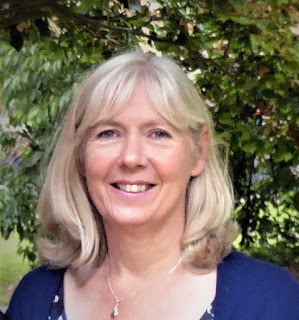 Penny has a degree in Classics, and a passion for archaeology – during the summer months, you will often find her on her a ‘dig’ with a trowel in her hand. She has had a variety of jobs over the years, including ice-cream seller, theatre PR, BBC local radio, and TV critic for a British Forces newspaper.She has written four novels – The King’s Daughter is the story of Aethelflaed, Lady of the Mercians. The Saxon Wolves and The Saxon Plague are set in the turbulent aftermath of Roman Britain. Her inspiration for Twelve Nights grew from her love of the theatre in general, and Shakespeare in particular.Penny has two grown up children and lives with her husband in Hampshire.
Penny has a degree in Classics, and a passion for archaeology – during the summer months, you will often find her on her a ‘dig’ with a trowel in her hand. She has had a variety of jobs over the years, including ice-cream seller, theatre PR, BBC local radio, and TV critic for a British Forces newspaper.She has written four novels – The King’s Daughter is the story of Aethelflaed, Lady of the Mercians. The Saxon Wolves and The Saxon Plague are set in the turbulent aftermath of Roman Britain. Her inspiration for Twelve Nights grew from her love of the theatre in general, and Shakespeare in particular.Penny has two grown up children and lives with her husband in Hampshire.
Author Links:



